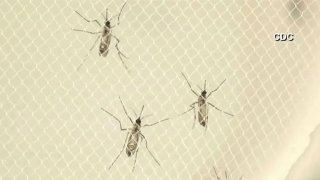
The Connecticut Department of Energy and Environmental Protection (DEEP) announced that a deer infected with EEE has died.
State officials said a white-tailed deer that exhibited neurologic symptoms in Lisbon died on Aug. 12 after being infected with eastern equine encephalitis, or EEE.
EEE is a serious, but rare illness that is caused by a virus that's transmitted by mosquitoes. If infected, it can cause significant brain damage.
So far, no human or horse cases of EEE have been reported in Connecticut this year, but they have been reported in nearby states such as Massachusetts, Vermont and New Jersey.
Get top local stories in Connecticut delivered to you every morning. >Sign up for NBC Connecticut's News Headlines newsletter.
A necropsy was conducted on the deer after its death, which showed EEE. The virus was first detected in mosquitoes last month.
Earlier this year, scientists who tested for the virus said they saw higher levels of activity, and part of it has to do with this summer's weather. It's a paradise for mosquitoes and the viruses that can come with them.
Humans can contract EEE through a bite by an infected mosquito. Human cases are rare, but can be very serious. Approximately 40% of people who become infected die from complications of the virus.
Local
Symptoms can include fever with chills, body aches and joint pain. In more serious cases, patients can develop meningitis or encephalitis (infection of the brain).
To reduce the risk of being bitten by mosquitoes, the CAES says residents should:
- Minimize time spent outdoors between dusk and dawn when mosquitoes are most active.
- Consider the use of mosquito repellents containing an EPA-registered active ingredient, including DEET, Picaridin, IR3535, oil of lemon eucalyptus, para-methane-diol (PMD), or 2-undecanone when it is necessary to be outdoors.
- Wear shoes, socks, long pants and a long-sleeved shirt when outdoors for long periods of time, or when mosquitoes are more active. Clothing should be light-colored and loose-fitting and made of tightly woven materials that keep mosquitoes away from the skin.
- Be sure door and window screens are tight-fitting and in good repair.
- Use mosquito netting when sleeping outdoors or in an unscreened structure and to protect infants when outdoors.



